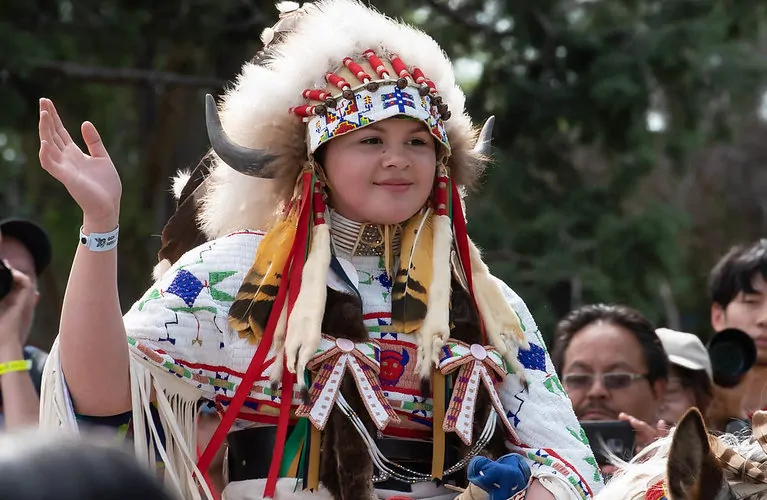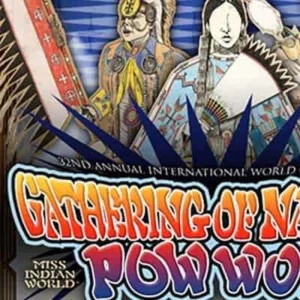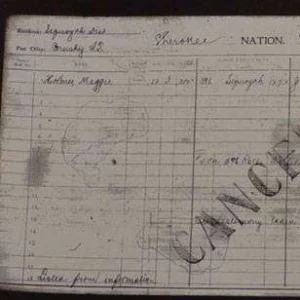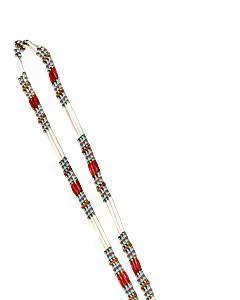What does “indigenous” mean?
You may have noticed an uptick in usage of the word in recent years. Perhaps you’ve heard Native Americans using “indigenous” to describe themselves.
Now, there’s even a holiday that bears the term.
Indigenous Peoples’ Day is celebrated across the United States on the second Monday in October and is an official city and state holiday in various localities. The holiday celebrates and honors Native American people and commemorates their histories and distinct cultures (Do you know how many federally recognized Native American tribes are in the U.S.?).
What Does “Indigenous” Mean?
“Indigenous” describes any group of people native to a specific region. In other words, it describes the people who lived in a given region before colonists or settlers arrived, defined new borders, and began to occupy the land.
Some examples of indigenous peoples include:
- the Aborigines and Torres Strait Islanders of Australia
- the Māori peoples of New Zealand
- the Inuit peoples of the Arctic in Alaska, Canada, and Greenland
- the Sámi peoples of Norway, Finland, Sweden, and Russia’s Kola Peninsula
Are “Indigenous” and “Native American” Interchangeable?
It’s important to recognize that the term “indigenous” is more inclusive than the term “Native American.” Since a person or group of people can technically be indigenous to anywhere, the term “indigenous” doesn’t just mean indigenous to North America.
When used in the U.S., terms like “indigenous peoples” or “indigenous land” typically refer to Native American people or land acknowledgments. The more specific term “Indigenous American” carries the same general meaning as “Native American” since both terms describe the original inhabitants of North America.
In conclusion, “indigenous” and “Native American” are not the same thing since Native Americans are merely one sub-group of indigenous peoples. Therefore, the two terms are not interchangeable.
When is “Aboriginal” More Appropriate?
“Aboriginal” means people living in a region “from the earliest time.” So it’s, more or less, interchangeable with “indigenous.”
Nowadays, the term is seldom used in the U.S., so unless someone explicitly expresses a preference for this term, you may want to opt for “indigenous peoples.”
The term “aboriginal” is, however, still used to refer to the First Nations, Inuit, and Métis peoples in Canada as well as “Aboriginal Australians.”
If you do use this term, use it as an adjective rather than a noun. For example, “aboriginal land.” And again, it’s best to use a more specific name, such as “Inuit people” or “Inuit language,” whenever possible.
Important Factors to Consider:
- There’s no single correct term to use.
- Always consider someone’s personal preference.
- No one person speaks for all indigenous people.
- Use the specific name of their nation or tribe whenever possible.
Indigenous-Related Terms to Avoid
While it's important to know and understand the ‘indigenous' definition and how to correctly use the term, it's equally helpful to know which words not to use.
Here's a list of related words that are generally best to avoid:
Native
While an indigenous person in the U.S. might refer to themselves as “Native,” it’s generally best to avoid using the term “Native” as a noun. Also steer clear of the plural form—“Natives”—which tends to carry negative or racist connotations.
Indian
Referring to Indigenous Americans as “Indians” is inaccurate. “Indian” describes someone from the country of India.
The only reason the word was ever used to describe Indigenous Americans is because when Christopher Columbus landed in North America, he thought he had sailed to India (oops). However, consider that some Native Americans do still identify as Indians. That’s their choice, and it should be respected.
Injun
“Injun” is a spelling representing the early American English colloquial pronunciation of Indian. However, the term is generally considered offensive today as it’s used to mock or impersonate Native Americans' or early settlers' heavily accented English.
Eskimo
People in many parts of the Arctic consider “Eskimo” a derogatory term because it was widely used by racist, non-native colonizers. Most people prefer other terms. The most commonly used is “Inuit,” which means simply, “people.” The singular, which means “person,” is Inuk.
Of course, as with so many words saturated by the crimes of colonialism, there’s no consensus on usage of the term “Eskimo.” Many Native Alaskans still identify as Eskimos, in part because the word “Inuit” isn't part of the Yupik languages of Alaska and Siberia, according to NPR.
Still, the best decision is to altogether avoid the term “Eskimo.”
Redskin
“Redskin” has historically been used as a racial slur against Native Americans. If you’ve been following the news, you probably heard about the high-profile name change of Washington’s NFL franchise, which long used the “Redskins” moniker.
In July 2020, after significant financial pressure from sponsors pulling out of partnerships, the Washington Redskins announced they would officially change their name. While some criticized the move as purely financially motivated, others lauded the change as the correct decision, regardless of the rationale for making it.
Spirit Animal
Though it might seem harmless to call a sloth your “spirit animal,” referring to animals or people as such appropriates indigenous traditions and culture by making them into jokes. So if you aren’t indigenous, it’s best to avoid saying you have a spirit animal.
Tribe
Again, hijacking the term “tribe” to describe your group of non-native friends, even playfully, falls in the same territory as “spirit animal.” Even if you don’t mean to be offensive, this constitutes a form of cultural appropriation, and it’s best to avoid it.
Savage
European settlers called Native Americans “savages” because they viewed them as less than human. For that reason, the term carries connotations of white supremacy, and it’s best to drop this term from your vernacular to avoid causing harm to those around you.
Squaw
This one’s a no-brainer, but we have to include it because, remarkably, the term is still in use in certain parts of the U.S.
“Squaw” is an ethnic and sexual slur that dates back hundreds of years. The term refers to a Native American woman’s genitalia, thus sexualizing and objectifying Native women in a humiliating fashion. It also serves as a painful reminder of how European settlers once used Native female bodies in whichever way they pleased.
Embarrassingly, there’s a town called Squaw Valley in California that’s—for obvious reasons—been under pressure to change its name.
Costume
You might think you’re complimenting someone dressed in traditional regalia by saying “I love your costume!” In fact, the opposite is true. The clothing worn by Native Americans during dances and other ceremonies is “regalia.” Calling it a “costume” implies that they’re dressing up as someone else—the way someone might on Halloween—when in fact, they’re paying homage to their own ancestral histories and traditions.
Last Updated on February 16, 2024 by Paul G




John Henrik Sakk
says:The Sami are however not the first people to settle Scandinavia but rather immigrated from the east some 6000 years after the first settlers. In the northern part it was closer to 3000 years. The term the Scandinavian use for Sami is Urfolk which could be translated to Indigenous, however the Scandinavian definition for the word is “people living in an area when the modern day borders where established and have fully or in part kept their unique culture and political institutions.”
This of course causes some confusion on the international stage regarding the settlement of Scandinavia but it is put in place to protect a minority culture.
Gale M
says:Thank you so much for your articles. The articles have been eye opening.
Ray
says:Great reading until you used “whiskey” and “bourbon”. You could have explained your point in a different way or used a different example.
I am proud to be an American Indian. My ancestors signed documents with the United States. When the United States honors all their promises to the American Indian then perhaps I will change my view. We’re still here.
Paul G
says:Thanks for the feedback.
P. H.
says:It seems to me that the term Native American also correctly refers to tribal people, who are indigenous to Central and South America, as well. As Native North Americans, we aren’t the only people who are indigenous to the Americas.
Giovanni Johns
says:HEADDRESSES IN NATIVE CULTURES
For the most part, headdresses are restricted items. In particular, the headdress worn by most non-natives imitates those worn by various Plains nations. These headdresses are further restricted within the cultures to men who have done certain things to earn them. It is very rare for women in Plains cultures to wear these headdresses, and their ability to do so is again quite restricted.
So unless you are a native male from a Plains nation who has earned a headdress, or you have been given permission to wear one (sort of like being presented with an honorary degree), then you will have a very difficult time making a case for how wearing one is anything other than disrespectful, now that you know these things. If you choose to be disrespectful, please do not be surprised when people are offended… regardless of why you think you are entitled to do this.
Even if you have ‘native friends’ or are part native yourself, individual choices to “not be offended” do not trump our collective rights as peoples to define our symbols.
From <https://apihtawikosisan.com/hall-of-shame/an-open-letter-to-non-natives-in-headdresses/>
Running Doe
says:osiyo for sharing love reading very much, wado